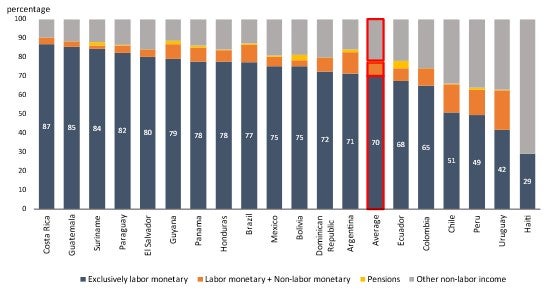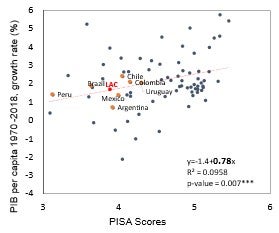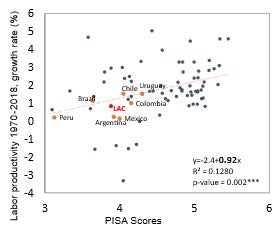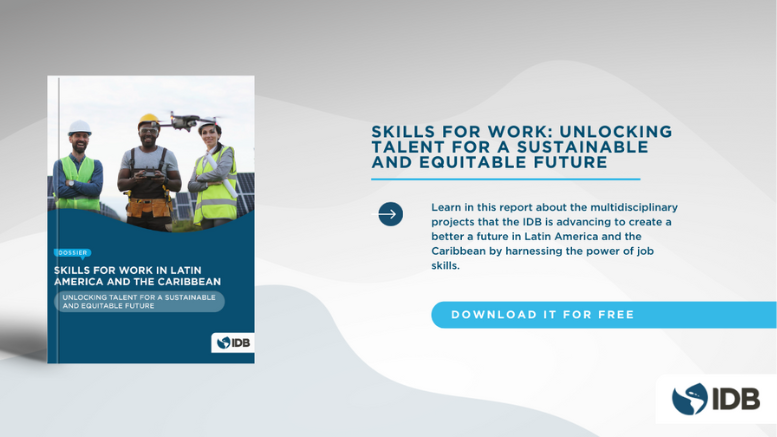It’s been proven that an efficient response of the workforce to the human capital needs of the economy boosts labor productivity and, as a consequence, economic growth. People with the right skills have better opportunities to access high-quality jobs, improve their earnings and enhance their quality of life and that of their families. Employers require workers with up-to-date skills, while students and workers need innovative ways of learning and content to keep pace with evolving business and productivity environments.
An effective skill for work development system, also known as Technical Vocational Education and Training -TVET-, that provides equal access to quality and relevant training, can increase economic opportunities, productivity and enable a sustainable, inclusive, and fair economic transformation. Therefore, it is urgent to reduce the skills for work gap to boost development and productivity in Latin America and the Caribbean.
To what extent people in Latin America and the Caribbean rely on their work?
In Latin America and the Caribbean 70% of people depend exclusively on their jobs to generate income; if unemployed, they lack an alternative income source to sustain themselves and provide for their families. And, although some people have other sources of income from the ownership of assets, pensions, remittances, and others, 88% of the income of the economically active population in the region comes from salaries (monetary labor wage income). This is why skills for work are a prerequisite to improve people’s lives.
The following graph shows the percentages of the economically active population reliant exclusively on a particular type of income in 19 countries of the region. In 16 out of the 19 countries analyzed, most of the population depends solely on their salary as a source of income.
Exclusive Source of Income Composition for the Economically Active Population in Latin America and the Caribbean

Skills for work have a direct impact on the well-being of workers, companies, labor productivity, development, and economic growth.
The development of relevant skills for work should be the cornerstone for enhancing the economic and productive development of countries in the region. It is only through a high quality learning system that is both implemented and aligned with the demands of the productive sector, that it is possible to adequately prepare the population to foster and contribute to a country’s productive development.
When analyzing the relationship between the skills of a population -measured by results on standardized tests like PISA-, and macroeconomic indicators such as GDP per capita and labor productivity, a positive correlation between countries with populations with higher skills levels and greater growth in both GDP per capita and labor productivity becomes evident.
Relationship between the skills of a population and macroeconomic indicators


Source: Authors using data from the PISA test scores by Hanushek and Woessmann (2012), average years of schooling from UNESCO, and the per capita GDP growth and labor productivity using the real GDP in PPP from the 2017 Penn World Tables v.10.
Therefore, any discussion related to sustainable and inclusive development, quality of life and even inequality should incorporate a substantive conversation on how to equip people to access quality employment opportunities, especially in sectors that are currently generating or have a high potential to create high-quality jobs.
How is Latin America and the Caribbean doing regarding their skills for work?
Learning from the past
The development of skills for work is not a new topic in either academia or practice. Gary Becker -Nobel prize winner in Economics in 1992 – defined human capital as the set of productive capabilities as early as 1964. Furthermore, in Germany, TVET was fully aligned with the labor market over a century ago.
So, how can we leverage this experience and knowledge today in Latin America and the Caribbean?
The first step is to understand what skills for work are.
We define them as those skills and qualifications to find, retain and progress at work; skills that also allow a worker to advance in their career path enabling workers to switch between jobs and to adapt to everchanging job markets.
The second step is to understand the relevance of the connection between labor supply and demand, which means that skills for work development systems need to be truly connected to the needs of companies and the productive sector. To establish this connection and thus improve the functioning of the labor market through the development of skills for work, key questions must be answered from three different perspectives:
i) On the side of employers, the productive sector, and the local economy: What skills does the productive sector need and will need to grow and create quality jobs? What skills are required to create new businesses? What skills will be necessary to maximize the potential of a country’s strategic productive sectors?
ii) On the side of current and future workers, we want to identify: What skills do people have? What is the skills profile of the current and future workforce? and finally,
iii) What should be the objective of a successful skills for work development system? How do we create an array of learning solutions that guarantee that people learn and ensure that what they learn is valuable, relevant and responds to labor demand?
In Latin America and the Caribbean, TVET came to existence with this goal in mind. However, their disconnection from the productive sector and the absence of training pathways has slowed their impact and limited the achievement of their objectives. Secondary and postsecondary education in the region needs a transformation that integrates the trends shifting the labor markets such as the fourth industrial revolution and the digital transformation. Additionally, it should consider the increasingly aging populations and the transition to green economies and climate change action.
Betting on TVET to transform skills for work in the region
To establish a relevant and widely encompassing skills for work development system, in close collaboration with the productive sector, the IDB has created solutions to identify and develop skills that meet both present and future labor market demands in the region. The aim is to develop qualifications and curricula aligned with career trajectories that address the needs of the productive sector and are recognized by it through the certification of qualifications and competencies.
The Multi-donor Fund for the Transformation of Technical and Professional Education in Latin America and the Caribbean the – TVET Fund – is an IDB initiative established in 2019 to create modern skills for work development ecosystems driven by the private sector that provide people with the skills necessary to develop successful career pathways of lifelong learning and boost the region’s economic growth.
The TVET Fund enables the development of innovative skills training projects and promotes the generation of novel solutions that respond to the needs of workers and the productive sector. Among the projects developed through the TVET Fund are initiatives related to the generation and promotion of skills for the green economy, skills for the use of novel technologies, incorporating a gender and diversity strategy.
By transforming the TVET ecosystem in the region we want to seize the new opportunities available today and turn skills for work development systems into engines of progress. Our goal is to foster sustainable and inclusive economic growth and to increase productivity in Latin America and the Caribbean.



Leave a Reply